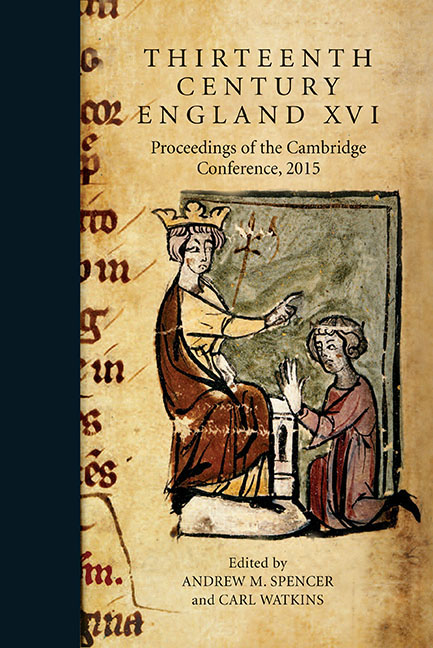Book contents
- Frontmatter
- CONTENTS
- List of Illustrations
- List of Contributors
- List of Abbreviations
- Introduction
- The Uncertainties of Reformers: Collective Anxieties and Strategic Discourses
- Moral Dilemmas in English Confessors’ Manuals
- Damnatio Eternae Mortis or Medicinalis Non Mortalis: The Ambiguities of Excommunication in Thirteenth-Century England
- The Contribution of Thomas Docking to the History of Political Thought
- Dealing with Inadequate Kingship: Uncertain Responses from Magna Carta to Deposition, 1199–1327
- The Rebel's Four Dilemmas in the Long Thirteenth Century
- The Daughters of William the Lion and Queen Ermengarde
- Simon de Montfort and the Ambiguity of Ethnicity in Thirteenth-Century Politics
- The Hue and Cry in Thirteenth-Century England
- Recalling Anglo-Scottish Relations in 1291: Historical Knowledge, Monastic Memory and the Edwardian Inquests
Dealing with Inadequate Kingship: Uncertain Responses from Magna Carta to Deposition, 1199–1327
Published online by Cambridge University Press: 23 August 2019
- Frontmatter
- CONTENTS
- List of Illustrations
- List of Contributors
- List of Abbreviations
- Introduction
- The Uncertainties of Reformers: Collective Anxieties and Strategic Discourses
- Moral Dilemmas in English Confessors’ Manuals
- Damnatio Eternae Mortis or Medicinalis Non Mortalis: The Ambiguities of Excommunication in Thirteenth-Century England
- The Contribution of Thomas Docking to the History of Political Thought
- Dealing with Inadequate Kingship: Uncertain Responses from Magna Carta to Deposition, 1199–1327
- The Rebel's Four Dilemmas in the Long Thirteenth Century
- The Daughters of William the Lion and Queen Ermengarde
- Simon de Montfort and the Ambiguity of Ethnicity in Thirteenth-Century Politics
- The Hue and Cry in Thirteenth-Century England
- Recalling Anglo-Scottish Relations in 1291: Historical Knowledge, Monastic Memory and the Edwardian Inquests
Summary
In his review in The Times of the fourth volume of Jonathan Sumption's history of the Hundred Years’ War, the columnist David Aaronovitch contrasts French and English attitudes to kingship using the modern political analogy of the Labour Party and the Conservatives. The French, he suggests, like the Labour Party, ‘tended to hang on to [their kings] even when incompetent’, while the ‘Tory English … deposed theirs freely’. This is hardly a new insight, of course – this was very much the French view of the English in the late Middle Ages. Historians of fifteenth-century England in recent decades, however, have sought to explain the depositions in a much more ‘Labour’ way than a ‘Tory’ one. Far from being eager to pounce on any chance to remove their incompetent or tyrannical kings, the English rather, in the words of Christine Carpenter, ‘exhibited an almost saintly patience in the face of overwhelmingly kingly provocation … killing kings was not an English national sport … even opposing them tended to be undertaken with some reluctance.’
It is true that it took the English political community many years to get round to deposing Richard II and Henry VI, but, as in the breaking of any taboo, deposition was much easier to contemplate once it had been accomplished the first time. This essay aims, in a relatively short space, to tell the long story of how that taboo was breached for the first time and how the English polity, having flirted with deposing King John, twisted and turned during the long thirteenth century to avoid deposing their monarchs. In John, Henry III, Edward I and Edward II, England had kings who were, in different ways and for all or a part of their reign, offering their subjects inadequate kingship and the responses that the political community came up with, from Magna Carta, to the Provisions of Oxford, to the Articuli Super Cartas and the Ordinances of 1311, were all attempts to try to solve the same fundamental problem – how should one respond when a legitimate authority behaves illegitimately? While the solutions they attempted were, on the face of it, often quite different, each took notice of what had gone before and tried to find another way.
- Type
- Chapter
- Information
- Thirteenth Century England XVIProceedings of the Cambridge Conference, 2015, pp. 71 - 88Publisher: Boydell & BrewerPrint publication year: 2017



